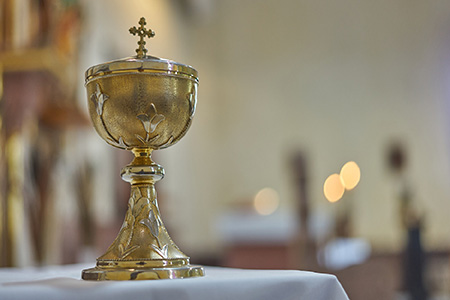 1 Kings 19:4-8
1 Kings 19:4-8
 Ephesians 4:30 - 5:2
Ephesians 4:30 - 5:2
 John 6:41 - 51
John 6:41 - 51
Today's First Reading, recounting Elijah's journey in the wilderness, recalls Israel's own forty-year sojourn in the desert. Like Moses before him, Elijah feels that he is not up to the task of providing religious leadership for Israel (rf Num 11:11-15). On one hand, he experiences failure (the event on Mt Carmel did not bring about the conversion of Israel rf 1 Kings 18:20-40); on the other hand, he is running for his life (rf Jezebel's threat 1 Kings 19:1-3). The once assured and triumphant Elijah is now deflated and depressed. Yet, as in the cases of Hagar and Jonah or the wandering Israelites, God provides practical and tangible help (rf Gen 21:15-20, Ex 16-17:7, Jon 4:6). The food and the drink, which Elijah received, enable him to go in strength for forty days and nights to where God wants him to be.
In the Gospel reading, God makes provision again, this time in the person of Jesus. The discourse on the Bread of Life is a continuation of the miracle of the multiplication of the loaves. After providing the tangible food to the crowd, Jesus offers another kind of food to them, “I am the bread of life” (Jn 6:48). This food surpasses the manna which the Israelites ate in the desert and the one which Elijah received. “This is the bread that comes down from heaven so that one may eat it and not die” (Jn 6:50). Jesus' offer of Himself as the living bread echoes the offer of the living water to the Samaritan woman whom He met earlier (rf Jn 4:13-15). Both of these food, which give eternal life, have their sublime sacramental dimension in later Christian theology (the living water of baptism which confers the Holy Spirit and the living bread in the Eucharistic communion).
Today, the same God continues to make provision for us. In the Holy Sacrifice of the Mass, the consecrated bread and wine has truly become the body and blood of the same Jesus who has taught about this food to the crowd two thousand years ago, “Whoever eats of this bread will live forever; and the bread that I will give for the life of the world is my flesh” (Jn. 6:51). Inasmuch as our body needs rest and replenishment like what God and Jesus have given to Elijah and the crowd respectively, our spiritual self also needs nourishment in order to grow and develop. If what have been given to Elijah and the wandering Israelites are sufficient and strengthening, how much more efficacious would it be that Jesus Himself is food when we receive Him in the Holy Communion, the fruit of His sacrifice?
How blessed are we now to be able to have this food which the crowd has requested but not received, “Sir, give us this bread always” (Jn 6:34). This sacred food, the Eucharist, through which flows the grace of heaven, is truly the Bread of Life. Throughout the ages, it feeds believers and strengthen their faith; it gives birth to saints and emboldens martyrs; it comforts the sick and calms the dying. On the individual level, it enables us to obtain the forgiveness of sin and the strength of resisting temptation. On the collective level, it signifies the unity of each partaker in the mystical body of Christ, the Church. Truly, it unites, blesses and gives life.
Our knowledge and understanding of the wonder food should prompt us to appreciate God as a compassionate provider. Whether we are like Hagar the slave, Jonah the runaway messenger, Elijah the despondent prophet , the complaining Iraelites or the hungry crowd, the same Lord ministers to our needs, both physical and spiritual, in the past and present. Our readings today assure us that God accompanies us always.
